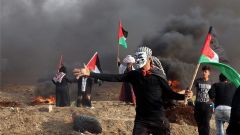Share
Human Rights Voices
While the UN devotes its human rights operations to the demonization of the democratic state of Israel above all others and condemns the United States more often than the vast majority of non-democracies around the world, the voices of real victims around the world must be heard.
Palestinian Authority/Gaza, April 13, 2019
3 Gazans caught entering Israel; one of them armed with a knife
Original source
Israeli forces on Saturday arrested three Palestinians who crossed over the border fence with the Gaza Strip, the army said.
One of the Palestinians was found to be carrying a knife, according to the Israel Defense Forces, who said the suspects were taken for questioning.
The incident came a day after deadly clashes on the Gaza border as part of the weekly "March of Return" demonstrations.
Palestinians said a 15-year-old was shot and killed during Friday's protests. Rioters threw rocks and fire bombs at IDF troops during the rallies, and soldiers responded with tear gas and live fire.
The Hamas-run Gaza health ministry said the youth, identified as Maysara Abu Shaloof, was hit in the stomach by live fire. It said 66 other Palestinians were wounded; it was not clear how many of them were hit by live fire.
The army did not comment on the death, but said that troops had apprehended a Palestinian armed with a gun "near the fence in the northern Gaza Strip." He was taken for questioning by security services, the IDF said.
The army put the number of protesters at 7,400, saying that it had also identified several attempts to approach the border. "The army responded with riot dispersal means and live fire in accordance with the rules of engagement."
Nickolay Mladenov, the United Nations envoy for Middle East peace, offered his condolences on Saturday over Abu Shaloof's death and called on Israel to refrain from using lethal force "except as last resort."
Numbers at the protest were down from last week, when 10,000 Palestinians participated, and the week before, the one-year anniversary of the start of the marches, which drew over 40,000.
Friday's protests were the first since the elections in Israel and came weeks after understandings were reportedly reached between Prime Minister Benjamin Netanyahu's government and Hamas.
Egypt, the United Nations and Qatar have recently worked to broker ceasefire understandings between Israel and Hamas, which, if finalized, would provide for an end to violence emanating from the Strip in exchange for the Jewish state easing some of its restrictions on the movement of people and goods into and out of the coastal enclave.
Israel says limitations on movement aim to prevent Hamas and other terror groups from transferring into Gaza weapons and materials used to construct tunnels and fortifications.
There appeared to be a breakthrough in the ceasefire efforts at the anniversary protests, when Palestinians in Gaza maintained relative calm along the border during large demonstrations.
Israel, in turn, reopened its two crossings with Gaza and significantly expanded the permitted fishing area around the coastal enclave.

